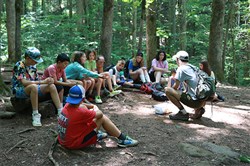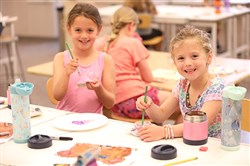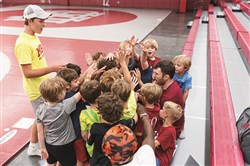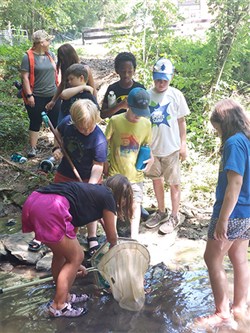VOL. 48 | NO. 8 | Friday, February 23, 2024
Turning playtime into learning
By Nicole Childrey
Come late May, school’s out for summer across Tennessee. But with the subject of post-pandemic learning loss lingering in the news and the linoleum-lined halls of elementary and secondary schools, would Tennessee children benefit from school being in, even just a little bit?
That question has been on the minds of plenty of parents, educators, legislators and people who lead the camps and programs that often fill students’ summer months, too.
Concern seems founded, given the steady alarm from that sounds as researchers study the academic impact of a fractured 2020-21 school year and release their findings.
“The Pandemic Erased Two Decades of Progress in Math and Reading,” a 2022 New York Times headline read. “Students Aren’t Rebounding From the Academic Effects of the Pandemic,” EducationWeek echoed in 2023.
The headlines resonate with many Tennessee parents, including Nashville’s Charlotte Cooper, a 20-year educator in Williamson and Davidson counties whose son entered fourth grade on a computer screen.
“He went from getting perfect on the TNReady (assessments), like fours, to he fails every test in math,” she says. “And I’m realizing that he just missed this high-quality review that he would’ve gotten by the end of the year in his fourth grade, when you’re trying to get all these basics – these really important foundational skills.”
Statewide, nationwide and global data may differ in the details, but consistently, post-pandemic scores in math, reading, and history declined for the average student compared to 2019, to a noteworthy and oft-noted degree.

At the Great Smoky Mountains Institute at Tremont’s Discovery Camp, children gain outdoor skills and learn more about nature in East Tennessee.
-- Photographs ProvidedA study in scientific journal Nature Human Behaviour found students missed about 35% of a normal school year’s worth of learning during the pandemic – “one of the largest disruptions to learning in history.” To climb back, the average student needs the equivalent of four to five months of extra schooling, according to findings from NWEA (Northwest Evaluation Association), the not-for-profit organization behind MAP testing.
Cooper’s solution to supporting her own teen son’s needs: summer camp with a side of academics.
Summer camps stand in
Across Tennessee, parents can find summer support in nearly every area of academic need, with programs from local schools, camps and organizations, as well as local outposts for chains including Mathnasium and Code Ninjas.
That isn’t new, but the benefits may be increasingly important, as some parents lean into the need and some programs adjust or expand offerings to help.
In 2023, Nashville’s Harpeth Hall launched the Summer Spark for Girls camp to “inspire academic and personal growth” in rising sixth graders, who would’ve been navigating foundational second-grade skills on screens during lockdown.

Campers engage in art projects at Harpeth Hall, but the school has also redoubled its efforts with summer STEM programs.
-- Photograph ProvidedCOVID-grounded learning loss didn’t directly instigate the program, says Harpeth Hall teacher and STEM Center for Girls director Jennifer Webster. But it was envisioned as a way to engage students from across the community with programming that can prepare them for the challenging academics of junior high and high school, in a period when that support feels very necessary.
The Summer Spark program joined many other camp offerings at Harpeth Hall, including the STEM Summer Institute, launched in 2012 for girls entering grades six through 12. The research-based program immerses campers in STEM skills in an on-the-ground way, introducing real-world problems and supporting students as they use science and engineering skills to prototype solutions.
SSI campers have designed birthing beds for women in Lwala, Kenya, based on a need Webster recognized while visiting there. They’ve also dreamed up flood shelters inspired by experiences close to home in Middle Tennessee. These projects turn STEM concepts into STEM applications and students see, in three dimensions, what academics can do.
“The lack of women in STEM in general, across the board – I think that’s one thing we try as a school to address in a lot of ways in our classrooms and in our programming,” Webster says. “Then the summer camp was an opportunity to stretch that even further, to be able to invite other students who don’t attend Harpeth Hall.”
Carrie Howell, owner and CEO of Nashville camp Leadership Academy, says tactile experiences like those are how summer camps can really fill in the learning gap, showing children how science and math concepts actively apply in labs, communities and even in critter-filled creeks.

Montgomery Bell Academy offers a wide variety of sports and academic camps.
-- Photograph Provided“I think the thing that really helps students out the most is in connecting to what they’re doing in the classroom, but in a way where you’re creating some buy-in for the hard work that they do at school,” she says. “When you, for example, take a field scope out and look at what organisms are living in a creek, you get a little bit of that ‘how to use the tool’ foundation. But you’re also creating positive associations with the science of microscopes.”
Howell’s outdoor science education background informs the way Leadership Academy pulls learning into play and exploration. But the integration, fittingly, is organic, led by the interest and excitement of the campers.
Educational opportunities crop up the same way at the farm and arboretum camps offered by A New Leaf in Nashville. Campers dance, paint and help care for goats and chickens, naturally stumbling into geology, ecology, economics and geometry along the way.
“We had this competition where the children had to collect sweet gum balls, because that was part of a scavenger hunt,” recalls Lisa Welgreen, the school’s director of communications and admissions. “And then it turned into this amazing project with children building quadrants with 20 sweet gum balls each – they mapped out the whole deck. So, there’s no, ‘OK, today we’re focusing on math.’ But when it comes up organically like that, there’s definitely room to explore and learn tools.

The Great Smoky Mountains Institute at Tremont specializes in outdoor activities.
-- Photograph Provided“And I think in a lot of cases it’s almost even more impactful that way. The children will learn a math skill or a math concept without even realizing that that’s happening.”
Balancing camp planning
Parents who believe in striking a balance between fun and learning in the summer-camp experience find a lot of support in Tennessee summer camp programming.
Camps and programs may manage that balance in different ways, some organically integrating STEM learning into fun-first programming, some offering a variety of specific camps – nonacademic options alongside ones that support subjects explored during the school year.
Camp Davis at the Gordon JCC in Nashville offers camps focused on flag football, theater and fashion design, alongside those that dig into the science of cooking and advanced robotics.
Nashville’s Montgomery Bell Academy books specialty camps geared toward baseball, basketball, rowing, squash and other sports and activities. It also offers a long list of coed academic prep summer sessions and Enrichment Camps with academic underpinnings – Cardboard Land taps into engineering and architecture skills, some Camp Brick options take a foray into simple robotics.
The curriculum and programming haven’t really changed much post-pandemic, says Mike Martin, the school’s director of camps & leagues. But the response has.
“We have noticed more and more, especially since the pandemic, just more students that are taking advantage of these classes – probably even kids that don’t need these classes but just want to take them just in case,” Martin says.
“For instance, lately our debate classes have gotten really popular. Our SAT, PSAT prep classes are popular now, in addition to let’s say a pre-algebra prep class or a Latin prep class. We’re seeing more and more older kids where they’re trying to kind of get a leg up as they’re thinking about their future.”
The traditional camp concept has stayed popular across Tennessee, too. Where parents might have waited until February or March to book summer camp slots pre-pandemic, camp planning season now stretches back before fall break. The popular YMCA Camp Widjiwagan in Antioch opened summer 2024 camp registration in late September 2023. By October, a third of their spots were full.
Finding the right camps and the right balance might be a challenge, but being able to intentionally step in and out of a fun-first focus makes the most sense to Amy Everhart, a mom of two and founder of Franklin’s Everhart Law Firm.
“The pandemic caused enough stress for my kids,” she says. “For us, summer camp is about the camp you choose. If we choose a classic summer camp, we want it to be about fun and give them a break from the school year.
“If we want a camp that focuses on academics or STEM activities, we choose those camps. For example, one summer we chose a week of robotics and a week of (Camp Widjiwagan) – a nice balance.”
Stepping up for SEL
While the importance of academics – and the need to combat post-pandemic learning loss – is clear, the data we see tends to center more on testing and benchmarks, less on one of the key skill sets nurtured during typical school days: social-emotional learning, or SEL.
That’s an aspect of learning loss many camp administrators and staff members noticed immediately in campers post-lockdown. And it’s an area of growth summer camps can step up to support, regardless of programming focus.
That social-emotional need was obvious enough to the staff at A New Leaf in Nashville that it prompted a change in approach. They went from single-week camp offerings to standard two-week sessions, with a recommendation of three weeks at a minimum. The aim, explicitly, was to offer more support to children who missed out on crucial social-emotional learning opportunities – steady time with peers and chances to cultivate and maintain relationships.
“We found the first year (after lockdown), children were coming for one week, and everybody was a bit shellshocked,” says A New Leaf’s Welgreen. “It would take them the whole week to even come out of their shells, and then they would be just hitting the sweet spot and the week was over.”
In educator and parent Cooper’s experience that kind of support is vital. Social-emotional learning and academic learning aren’t separate but important needs – they’re interdependent ones.
“If the social-emotional is not there, the academic’s not gonna be there,” she says.
Researchers from the Yale School of Medicine agree. Findings released in 2023 from a team of Ph.Ds. showed “students who participated in SEL programs do better in school, academically and socially.” Data affirmed a boost in everything from academic achievement to attendance and engagement when these skills were taught and applied.
Summer camp programs may not be the wholesale answer to erasing post-pandemic learning loss, but the campers themselves are clocking the educational benefits – even when the schedules are more about swimming, sun and fun than numerators and denominators.